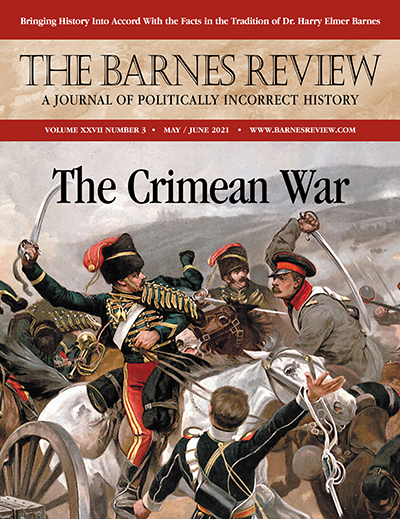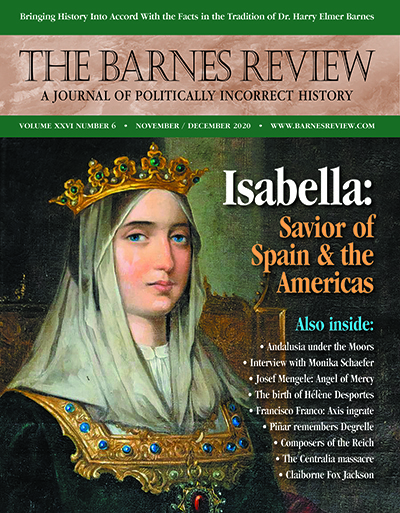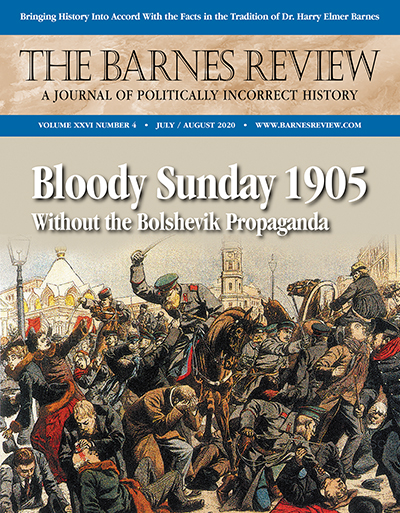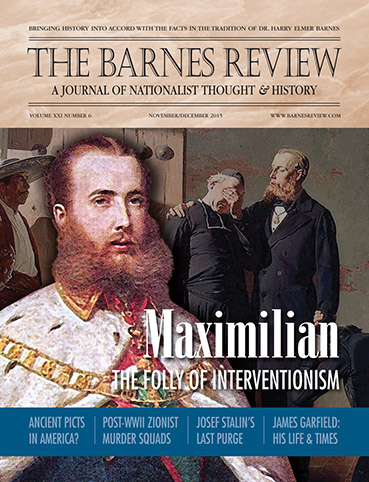Description
The Barnes Review
A JOURNAL OF POLITICALLY INCORRECT HISTORY
MAY/JUNE 2021 ❖ VOLUME XXVII ❖ NUMBER 3
TABLE OF CONTENTS
RUSSIA AGAINST THE WORLD: THE CRIMEAN WAR—FACTS & MYTHS
BY MATTHEW RAPHAEL JOHNSON, PH.D. There is so much about Russian history we are taught in school that simply isn’t true. And, while most people know very little about the Crimean War, what they have been taught may be nothing more than Western propaganda. Luckily, an expert on Russian history exposes the myths and corrects the lies about this war.
THE OTTOMAN DEBACLE AND THE INVENTION OF ALBANIA
BY MATTHEW RAPHAEL JOHNSON, PH.D. What is Albania? How many could point it out on a map? When did it become a nation and why? In this article, TBR explains the origins of the creation of the state of Albania and why it’s important for understanding modern-day European power politics.
DAVID ICKE AND THE THIRD REICH
BY JOHN WEAR, J.D. Popular writer David Icke has some whacky ideas, but he also has been way ahead of the curve on a lot of important topics including the New World Order, microchipping and the truth about 9/11. So, how could this intelligent man keep spouting such amazingly uninformed statements about the Third Reich?
TERRORISM IN CANADA: INSIDE THE OCTOBER CRISIS
BY RÉMI TREMBLAY, During the 1960s and 1970s, the U.S. was dealing with its own domestic terror problem. But few are aware that, just to our north in Canada, leftist terrorists were planting bombs and kidnapping prominent politicians.
MUSSOLINI’S WAR: APOTHEOSIS
BY FRANK JOSEPH, Finally, the long-awaited second and final volume of Mussolini’s War from TBR has arrived. Here the author explains the importance of Il Duce’s financial and cultural programs and how they nearly saved Italy from the problems it faces once again today.
TREVOR RAVENSCROFT: TWISTING HISTORY FOR PROFIT
BY WILLIAM A. WHITE, Who doesn’t like a good Indiana Jones movie? But where did all this “evil Nazis looking for religious relics” stuff come from, anyway? Some of it came from the imaginative mind of “historian” Trevor Ravenscroft.
EXTRAORDINARY KNOWLEDGE OF ANCIENT CIVILIZATIONS
BY MARC ROLAND, We moderns think we are so smart with our vaccines, fancy electronics and advanced robotics. But, in this article, we take a look at some of the things we take for granted today that were actually developed thousands of years before they were “discovered” again.
IRISH FOREIGN POLICY DURING WWI AND WWII
BY ANTONIUS J. PATRICK, The fact that Ireland is a nation today can be attributed in large part to the fact that the Irish people are fiercely independent freedom-lovers. During the two world wars, the Irish navigated a tricky and often dangerous road to independence.
THE REMILITARIZATION OF THE RHINELAND
BY JOAQUIN BOCHACA, Here is a fascinating analysis from the world’s preeminent Spanish-speaking Revisionist scholar Joaquin Bochaca. Here he analyzes one of the most momentous decisions of the years between the world wars: France’s insistence on signing a defense pact with the Soviet Union. That one decision had devastating consequences for the entire civilized world.
THE MOB, THE CIA & CASTRO
BY THE TBR STAFF, Back in the 1960s, U.S. intelligence was so desperate to knock off Cuban leader Fidel Castro, it turned to the Mafia. The Mob was more than willing to help, hoping to regain its lucrative business ventures in Cuba.
From The Barnes Review, May/June 2021
Personal From the Editor
QUESTION EVERYTHING
So much of what we are being taught and told by “woke” universities, mainstream fake news outlets and politically correct history professors is pure fiction, but, still, they demand we believe it all without question, to take a leap of faith and “trust the experts.” If not, you’ll be “canceled.” This applies also to what many of our elected officials are telling us about all kinds of important topics including the immigration crisis, the hyped-up threat of Covid-19, systemic racism, male and female biology, “White supremacy,” social issues, “mass shootings,” our right to free speech and many more.
I counsel you, right now, right here, to remain skeptical of everything you hear and read, and certainly don’t take anyone’s “word” for anything. The fact is, there is almost no one left you can trust in academia, politics or the news conglomerates. As you peruse through this issue of THE BARNES REVIEW, we encourage readers to fact-check everything you see and, if you find an error, let us know and we will correct it.
That being said, in this issue, TBR tries to do what it has done in every issue since we began publishing in October 1994—174 issues including this May/June edition—when our first TBR rolled off the presses: challenge readers to discard what they thought they knew about history and open their minds to a new reality, one based on real facts and real science, not the war propaganda and political and cultural agitprop churned out by tenured court historians, politicians and mockingbird media moguls 24 hours a day, seven days a week. Our lead article in this issue, for instance, discusses the Crimean War.
In this piece, Russia scholar Dr. Matthew Raphael Johnson explains what that war was really all about and disputes the simplistic textbook narrative from start to finish. Thought- provoking articles in this issue also include ones on the creation of Albania (sure to get some people riled up), the deficiencies of David Icke when it comes to Third Reich history, the leftist assault on Canada in the 1960s and 1970s, the true legacy of Mussolini and his armed forces—both victimized for nearly a century by false war propaganda still being spouted today, Trevor Ravenscroft’s silly (but widely believed) book on Adolf Hitler and the Spear of Destiny, the real reasons Germany re-occupied the Rhineland (certainly different from what you will see almost anywhere else), a quick primer on some of the many wondrous achievements of a variety of ancient peoples around the globe that surprise honest scholars even today, Ireland’s quest to stay neutral during the world wars and a short article on the CIA- Mafia plots to kill Fidel Castro and affect regime change in Cuba. All in all, we know this issue will get your brain churning, which is the whole point of THE BARNES REVIEW in the first place. And, again, we encourage you to question everything, research events yourself and never let a lie go unchallenged.—PAUL ANGEL, Executive Editor
Barnes Review Editorial
A NEW CRIMEAN WAR BREWING?
There is something particularly unnerving about President Joe Biden’s apparent desire to provide “unwavering support” to Kiev if the Ukrainians should choose to confront Russia in an armed conflict—a new Crimean War—which they are certain to lose unless the Europeans and the United States should choose to commit to a massive intervention that could easily go nuclear. The image of hundreds of lemmings pouring over a Norwegian cliff into the sea comes to mind.
If it were only Dementia Joe calling for a possible war in support of Ukrainian President Volodymyr Zelensky it would be bad enough, but NATO chief Jens Stoltenberg echoed the noises being made by Biden and was quickly joined by a chorus consisting of Britain’s Boris Johnson and spokesmen for the European Union. Turkey has actually entered into what it calls a “strategic partnership” with Ukraine and is threatening to supply Kiev with long- range missiles, which Russia has promised to bomb once they are in place. Over the centuries, the Turks have al- ways tried to weaken Russia in any way they could. The reality is that actual democracy, if that really means one vote for everyone, favors Russia in its dispute with Ukraine. Both areas of what was included in the administration of Ukraine under the Soviet Union that are in dispute are overwhelmingly inhabited by Russians.
Crimea was administratively part of Russia between the time it was conquered under Catherine the Great in the 18th century, and 1954 when it was transferred to Ukraine by Nikita Khrushchev for administrative reasons. A plebiscite in Crimea in 2014 resulted in 97% approval for integration into the Russian Federation. Both those regions were incorporated in independent Ukraine when the Soviet Union broke up back in 1991, without the consent of their inhabitants and in conditions of very doubtful legality and legitimacy. Still, no one challenged their union with Ukraine until after the coup d’etat in 2014 that brought in a largely far-right, pro-European and American government which quickly canceled the teaching of Russian language in both areas. This, plus other steps taken to undermine local control of government in the ethnic Russian areas, provoked the revolt in both Eastern Ukraine and Crimea which is still playing out in the region referred to as Donbas.
Russia has warned that, if Ukraine’s president follows through on his promise to re-acquire Donbas, it will mean war. Make no mistake, Vladimir Putin is serious—and has the re- sources to follow through on his commitment. As any serious provocation by Ukraine would inevitably lead to an easy military victory by Russia, it is clear that Zelensky’s thinking must center around his expectation that the U.S. and other Western forces would intervene on his behalf to drive the Russians out. Given the rhetoric coming out of Washington and several European capitals, he might appear to be correct, though there is a high level of risk in engaging in that kind of brinksmanship. First of all, though the pledges of support are on record, talk is cheap.
The Europeans in particular are not keen on war, even if their governments seem to be, and planners at the Pentagon surely know that Russian military doctrine dictates that if Moscow is facing superior forces it will use nuclear weapons as a first option. To avoid nuclear war, someone must give a reality check to Zelensky, making clear that there will be no more than token support for him if he starts a war. There is clearly a debate going on in the Biden administration about how to deal with Russia, though there is very little evidence of any realism. Many in the White House would like to see a hardening of the Western response to the Kremlin for economic reasons. Opposing the under-construction Nord Stream 2 pipeline that will send Russian gas to Germany has been a firm policy of both the Trump and Biden administrations because Washington would like to provide its own higher-priced gas instead.
Biden is about to appoint what appears to be a hardliner as special envoy to stop the pipeline. Amos Hochstein, born in Israel of American parents and a veteran of the Israeli army, was the former special envoy and coordinator for international energy affairs under Barack Obama. He was, until last year, chair of the supervisory board at Ukrainian energy giant Naftogaz. He was informally offered the special envoy job late last month by National Security Advisor Jake Sullivan. Be that as it may, there is clearly no benefit to the United States that can be obtained by allowing the situation between Ukraine and Russia to deteriorate to the point of a 21st-century Crimean War. To counter the adlibbed and incoherent Bidenesque assurances that the U.S. will somehow support Kiev, it is necessary to send a firm message to Zelensky that if a border war erupts between the two countries there will be no knight on a white horse coming from Washington or Western Europe to bail out Zelensky.—PAUL ANGEL, Executive Editor.




